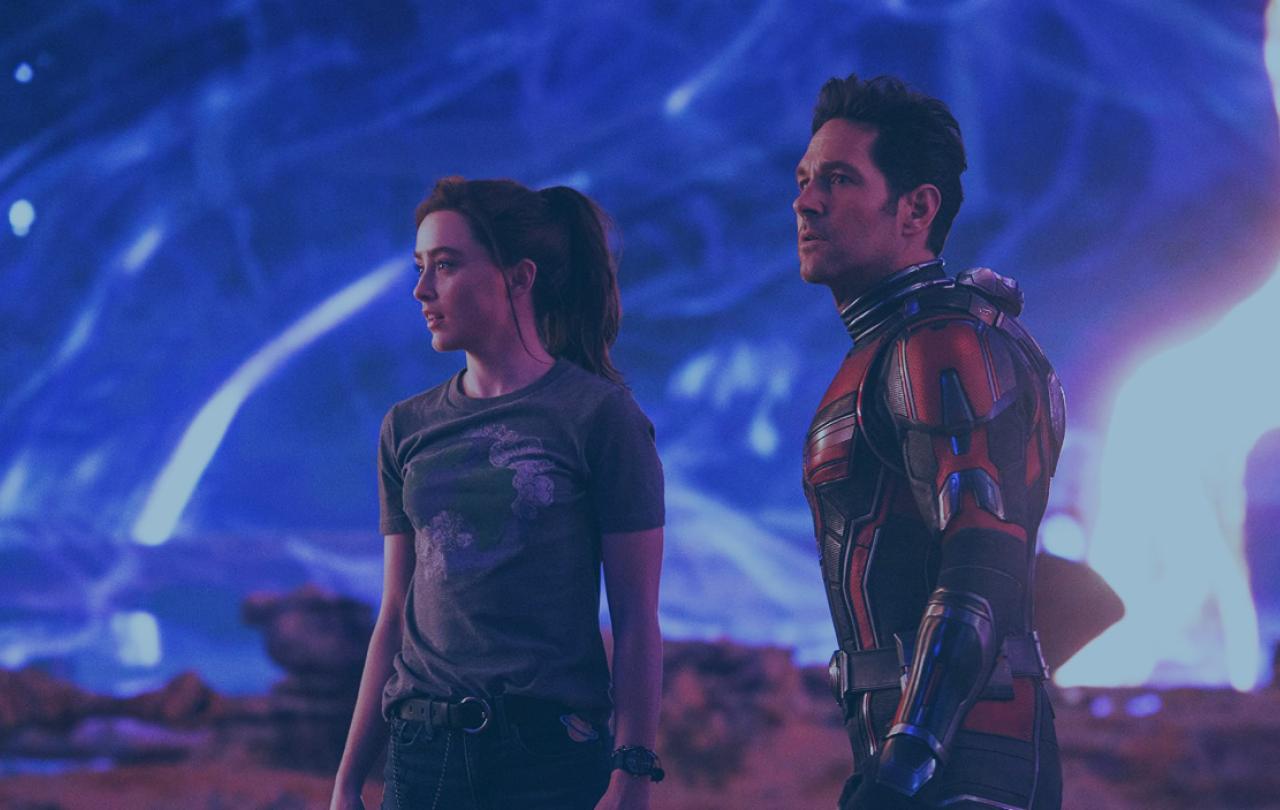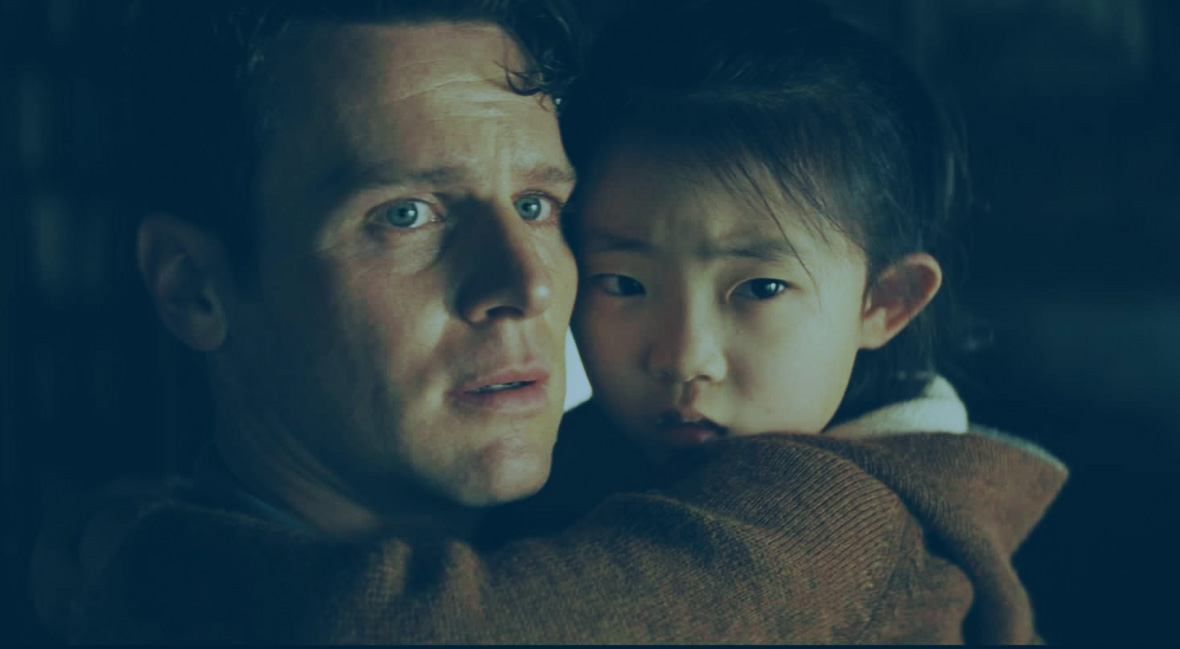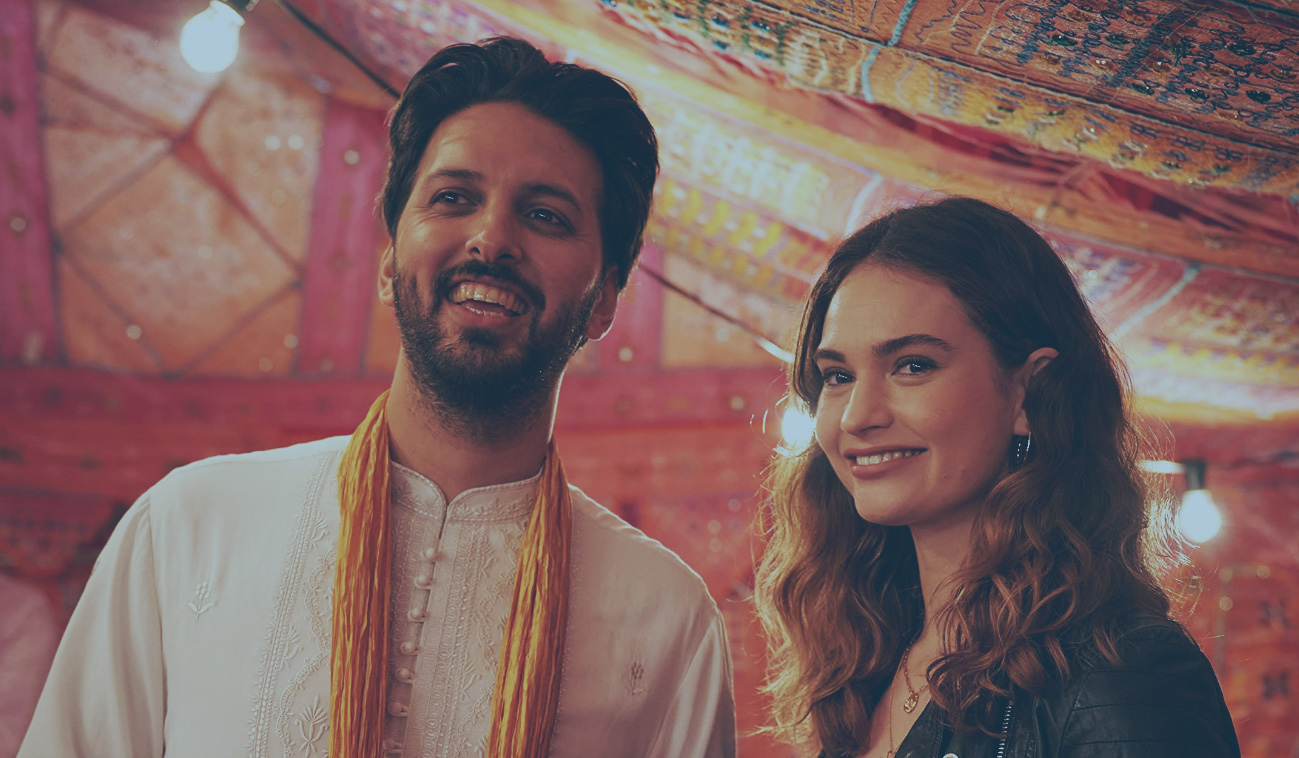
Ant-Man & the Wasp: Quantumania is the latest release from the Marvel Empire (in whose shadow we all live). The Empire is very much faltering. The main (sensible) criticisms levelled at the Marvel franchise are formulaic films and over-complicated stories that require you to not only have watched all the relevant films in the series, but also now the various TV series pumped out by Disney Plus. Ant-Man doesn’t fix them.
The plot sees Scott Lang enjoying a happy life: adored by a grateful public and with lots of time to spend with his partner Hope and his daughter Cassie. However, Cassie has grown up since ‘the snap’ and is now protesting injustice and getting arrested. Scott wonders how he can best re-connect with Cassie and make up for the five years he lost. This bonding is interrupted when all the heroes are sucked into the Quantum Realm by Kang who wishes to use the Ant-Man powers to retrieve a thing to escape the thing to do a bad thing… no sorry, it’s just ridiculous, I have no idea what is going on!
I’m a nerd and a fan, but even I sat there and got depressed at how incomprehensible and inconsequential it all felt. A simple ‘hero must retrieve object to save loved-ones’ plot groans under the sheer amount of exposition and world-building and forced emotional plotting. The first fifteen minutes are a passable family drama, and then everything is just CGI and battles and quips – SO MANY QUIPS!
Nothing is able to sit as a dramatic moment: immediately a joke, or a quip, or a gag has to be rammed down our throats.
The CGI is fine, but so great a surfeit gives the drama a weightlessness, making it impossible to invest in. The script…well…looking up Jeff Loveness’ previous writing credits was illuminating. He has written for pop-culture virus Rick & Morty and that influence is everywhere. Nothing is able to sit as a dramatic moment: immediately a joke, or a quip, or a gag has to be rammed down our throats, meaning weightless CGI is only compounded by a script that revels is cynicism rather than in character. This is the bloated Marvel writing formula: schoolboy humour must undercut every dramatic moment.
Paul Rudd can do this in his sleep, and at times looks like he is. Evangeline Lily is meaningfully absent. Michael Douglas is enjoyable enough as a bumbling octogenarian ant-enthusiast. The real emotional weight of the film comes from Michelle Pfeiffer and Jonathan Majors. Pfeiffer’s Janet is a haunted and scarred heroine, lying to escape a past she cannot outrun. She brings genuine depth and tension to the film, especially in her scenes with Majors. He is masterful as Kang, bringing both a physical and emotional presence that is wonderfully intimidating. He takes the work seriously, giving us a Shakespearean villain who is neither hammy nor po-faced. I’m a little peeved that yet again Marvel is giving us a ‘conflicted villain’ (it would be nice to have a battle between good and evil, black and white, rather than just shades of grey) but Majors is so good he won me over. Overall, it’s a slog and not worth seeing unless one is a Marvel completist.
2 stars.
Knock at the Cabin

Having sat through the literary assault of the Ant-Man script, I dreaded Knock at the Cabin. I have a soft-spot for M. Night Shyamalan, but his scripts are clanger-city. They’re exercises in verbiage (irony noted) that one endures to enjoy a good spook. I was pleasantly surprised, and silently grateful to co-writers Steve Desmon and Michael Sherman for reining in the worst of the ‘M.Night-isms’.
It is an efficient chiller. Eric and Andrew have brought their adoptive daughter Wen to a secluded cabin for a holiday. This turns into a hostage situation when four seeming strangers with odd weapons take them hostage and demand the family sacrifice one of their own to stop the coming apocalypse. As the drama unfolds we learn the four home-invaders are just ordinary people who have put their faith in visions that have led them to this action. As time runs out and people die the family is left to weigh the dreadful moral problem before them.
The film delivers its tension well – Jarin Blaschke’s cinematography elevating mundane conversations to new heights of the uncanny with shallow-focus and tilted cameras. The performances are solid. It’s nice to see Rupert Grint on the big-screen again, and Jonathan Groff brings a compassionate vulnerability to the character of Eric. The standout has to be David Bautista as the de facto leader of the attackers. He plays off his imposing physical presence perfectly, creating a shy and nebbish personality, unfailingly polite and apologetic. It heightens the tension throughout the entire film and the viewer wonders when or even if this hulking mass will lose violent control.
The film departs from its sources conclusion (2018’s The Cabin at the End of the World) to strike a more obviously tragic but also optimistic and possibly even Christian tone. It’s worth a watch on a rainy afternoon.
3.5 stars.
What’s Love Got to Do With It?

From a dud-script, to a better-than-expected script, to a great rom-com script. What’s Love Got to Do With It? is the first screenplay by Jemima Khan, and it is a terrific debut. Khan presents the tale of Zoe, who tries to boost her career as a documentary film maker by documenting the arranged-marriage of her Pakistani childhood friend Kaz. From the first meeting with the matchmaker to the big day itself Zoe learns about a culture and a practice that is completely alien to her own understanding… but perhaps she’ll learn something about it, and about herself. Is ‘assisted-marriage’ as it is now called ("Oh, like assisted-suicide" Zoe quips) a regressive practice? Is the world of Western dating a freeing alternative? Is there something to learn from allowing commitment to come first, and romance and love to build over time? What lengths will one go to in an effort to please their family?
It’s just lovely. Really lovely. A laugh-out-loud script that reminded me of Richard Curtis via Gurinder Chadha, a story that takes you from A to B with very few surprises (if you want intrigue don’t see a rom-com) but plenty of smiles, perfectly pitched performances, and a refreshing take on the notions of romance and marriage. All of this is tied together with a sublime turn by Emma Thompson. She steals every scene as Zoe’s politically incorrect and gaffe-prone mother. Every time she was on screen I was somewhere between guffawing and wetting myself with laughter. I’ve seen it twice now and loved it both times, but what’s more important, my wife loved it almost more than I did. If I had one complaint, it is that in a noble effort to conform to the great rom-com formula, Khan doesn’t quite seem to have the courage in her convictions. There is a fascinating, heart-warming, and genuinely positive portrayal of assisted marriage throughout the film…but the laws of rom-coms are such that romance must win out. It’s only a small quibble, and it doesn’t ruin the film; but I was left slightly deflated that this exploration felt incomplete. Still…a small criticism. It’s wonderful. Go and see it!
4.5 stars.
The family dynamic
Three very different films – horror, superhero, rom-com – with a common theme: family. Each film has the family dynamic as a driving force for the narrative. In Knock at the Cabin we have an ‘alternative family’ struggling not only with the trolley-problem on steroids, but also with doubt and constant suspicion. Is this real or a homophobic attack? Is our family chosen because people don’t believe we are a family? What does it mean to be a family that is entirely ‘chosen’? In Ant-Man the supposed emotional drive is Scott’s desperate wish to be part of his daughter’s life and make-up for lost time. There is a wonderful opportunity for tension and conflict when Kang (master of time as well as dimensions) offers to reward Scott by sending him back to before the snap to live out his daughter’s teenage years…squandered by sloppy storytelling, but a fascinating thought. In What’s Love Got to Do with It? Kaz is driven to seeking assisted marriage out of a sense of loyalty to his family, and the wish to begin a new one.
Each film posits the family structure and the family relationship as fundamental to human life, and the base motivation for human action: fight to reunite family, marry to please family, let the world burn to preserve family. For Christianity this is not a simple issue. Christianity has inherited a great deal from its Jewish roots, and fecundity and family-life is viewed as a good. Family life is presupposed by St Paul when writing advice on how a bishop ought to behave, and the family is often called the ‘aboriginal church’: the simplest unit through which the Christian faith is taught and practised.
And yet… Jesus refuses to see His mother and brothers and calls those listening to His teachings His mother and brothers; Jesus says that we will not have husbands and wives in the new heaven and new earth; Jesus also says to follow Him rather than bury our father; St Paul consistently argues that a single life devoted to God is to be preferred to marriage; the visions of Revelation suggest our time will be rather taken up with the worship of God (leaving little time to play catch or have a Sunday roast or argue over a game of Monopoly).
In seeking to heal their familial wounds Scott and Cassie nearly destroy the multiverse; and please don’t believe that it’s their love that saves it…Michael Douglas and his giant ants save the multiverse.
For the Christian, family life is not and cannot be the highest good, for to make anything other than God one’s ultimate good is dangerous folly. In seeking to heal their familial wounds Scott and Cassie nearly destroy the multiverse; and please don’t believe that it’s their love that saves it…Michael Douglas and his giant ants save the multiverse. On a smaller scale, Kaz nearly destines himself to a life of misery in an effort to please his family. M. Night departs from his literary source to give a hopeful ending: rather than sticking as a family in the face of an apocalypse they could avert, Groff’s Eric chooses to sacrifice himself. Like all good things, family ties and family loyalties and family loves can be just as destructive as they are life-giving.
The truth about the family that Christianity teaches is that the family is a wonderful and holy gift from God insofar as it reflects the goodness of God. Marriage is good and holy because it reflects and symbolises the love that Jesus has for His Church. Procreation is good because it fulfils God’s command for humanity to be fruitful. Family life is good because it is a space in which Christian love is able to flourish.
As soon as we forget that family life is a reflection of God, family life becomes a burden – and this is so easy to do. We can fetishise family life, demonise or diminish those who do not have a family, ignore those who are happily single; and all of this is wrong and hurtful and damaging. The epitome of the family in the Christian worldview is one where the completely self-giving love, which we see perfectly in Jesus Christ, is allowed to grow and flourish. Oddly enough, this is why Knock at the Cabin has the most Christian depiction of family life. In spite of it being a gay couple with an adopted child (not an uncontroversial idea in the modern Church) it is the one family that demonstrates the principle of sacrificing one’s self for the good of the other. That is what family is – a place where we learn to be willing to die for those we love, and even for those we have never met, and so modelling the Jesus who dies for the sins of the world.





